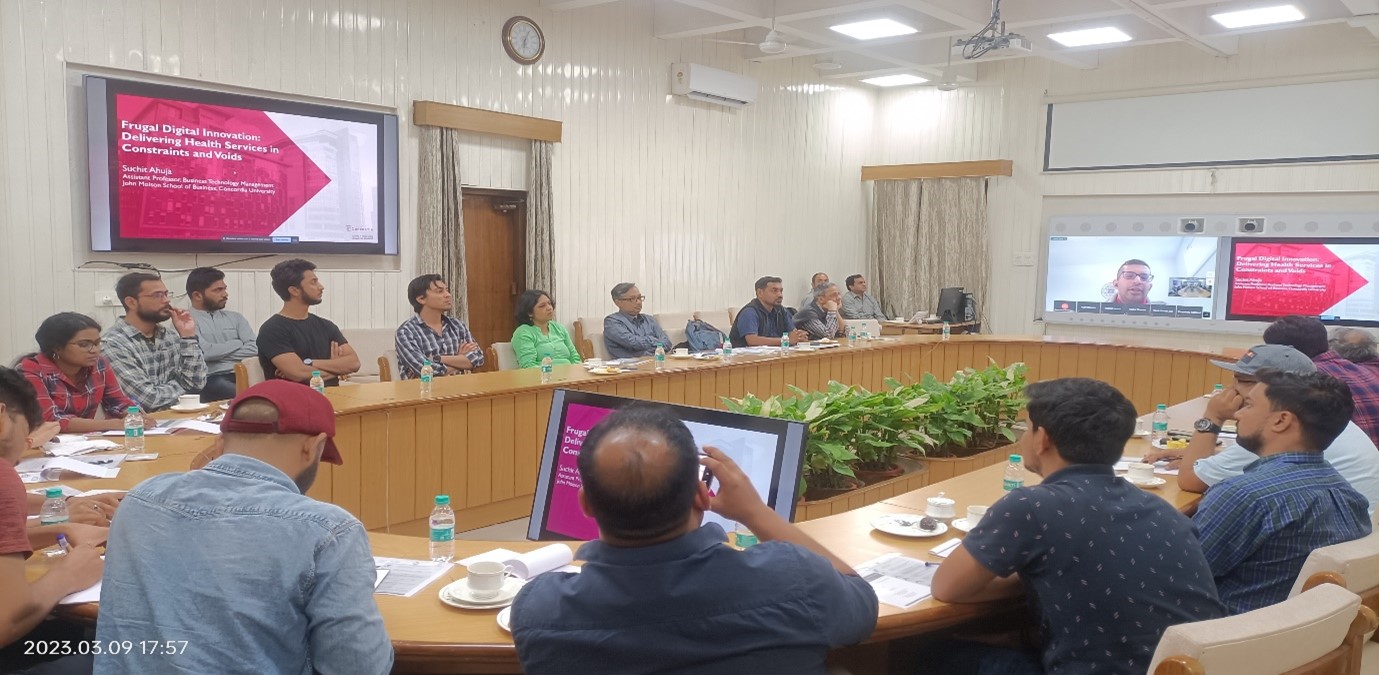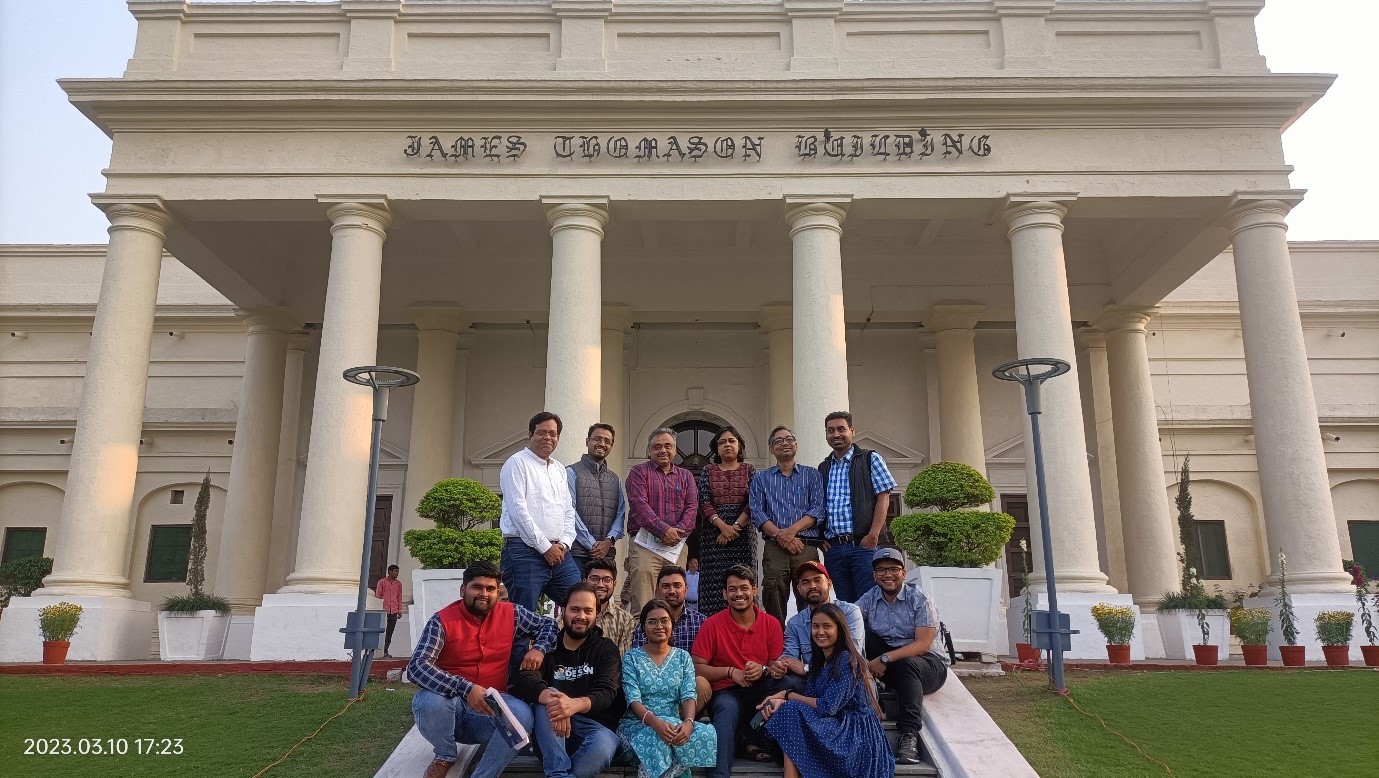Frugal Digital Technology for Healthcare Delivery: A Workshop Report
Priya Singh
June 19, 2023 | Report-backs
In India, a significant lack of access to healthcare emerged as a fundamental challenge during the Covid-19 pandemic, forcing people to rethink and reimagine ways and measures to maximize access to healthcare. Frugality or frugal philosophy, a relatively new terminology, emerged as a significant vantage point for countries like India. Frugal innovations aim to ensure ‘good-enough’ quality, simplicity, affordability and sustainability in an environment where necessity reigns and resources are limited. To discuss these ideas, a workshop was organized by the Department of Design, Indian Institute of Technology, Roorkee, in collaboration with Transdisciplinary Research Cluster on Frugality Studies (TRCFS), Jawaharlal Nehru University (JNU), New Delhi, on March 9 and 10, 2023. The primary objectives of this workshop were to propagate the philosophy of frugality and frugal innovations and to develop a roadmap for frugal studies. The workshop was designed as a dialogue that brought together Indian scholars from diverse academic disciplines such as science, technology, and law.
In the inaugural address, A.K. Sharma referred to frugality as a “revolutionary idea” capable of changing society's complexion. He added that there is a need for a multidisciplinary outlook and a community approach where ordinary people can contribute effectively. Currently, the designers mainly focus on only big or significant tech industries, according to Inderdeep Singh. Therefore, the concept of frugality gains potential importance.

A presentation in progress at the workshop [Image credit: Author]
Suchit Ahuja, the first speaker of the event, spoke on “Frugal Digital Innovation: Delivering Health Services in Constraints and Voids.” His presentation’s main thrust was on understanding what frugal digital technology means, how it connects to healthcare, especially in India and rural areas, and the conceptual evolution of frugality. He stated that frugal digital innovation could serve as a platform through which competitive advantage is built by overcoming resource constraints and institutional voids, where a fallout of absence or weakness of institutional regulation is referred to as an institutional void. These voids could be filled by reconceptualizing and framing the problem, aggregating resources, and networking with actors outside the industry. He viewed voids as problem-sensing tools that could help diagnose conditions that must be addressed.
Saradindu Bhaduri, after the presentation, pointed out that algorithms have biases and could disempower people involved with healthcare delivery through technological innovation. He highlighted the need for a separate and similar evolutionary account of frugality specific to the Global South as the current evolutionary understanding of frugality is understood in light of experiences in the Global North. He further suggested that we could either do away with the concept of void or reframe it differently.
Masfick Hazarika addressed the powering challenges of rural healthcare by focusing on clean energy solutions. His presentation mainly dealt with the Energy Programme of the World Research Institute (WRI), India, which seeks to ensure energy access, transition, and efficiency in remote and rural areas. Harsha Verma highlighted the issues and challenges faced by those in the handloom industry, such as the marketing, institutional inefficiencies, the unorganized nature of the industry, technological backwardness, inconvenient working conditions, and so on. She presented a mobile application that she had designed, “ताना बाना” (Tana Bana), with a vision to revive and create awareness about Indian handicrafts, encourage artisans, provide information through a website, and decrease their dependency on selling products. The application is highly customizable, designed to respond to the questions of artisans.
The next speaker, Bhaskar Bhowmick, explained the dominant industry perspectives in healthcare technology. Healthcare infrastructure in India suffers from many defects, such as insufficient hospital beds, healthcare centers, blood banks, urgently needed vaccines, and medical colleges. He then identified the requirements and concerns regarding the delivery of healthcare. His presentation focused on the innovation ecosystem prevalent in IIT Kharagpur, a fusion of academics, innovation and practice, and commercialization and funding. Nupur Chowdhury spoke on “Regulatory pathways for frugal innovations in healthcare.” She emphasized that an incongruent policy framework exists where an innovator is free to innovate, but the manufacturer is regulated by law. All the regulations, such as rights over data protection, market authorization (right to sell), patent protection, and research grants (incentives), are designed for manufacturers and not innovators. She recommended that technology be understood as part of freedom of expression and individuality. Further, recommendations included the creation of a class of “frugal products” through a law that will allow for accessing regulatory advice on a case-by-case basis and access funding.

Participants at the workshop [Image credit: Author]
A three-member panel consisting of Rajat Agarwal, Saradindu Bhaduri, and Bhaskarjit Neog was constituted to brainstorm future directions in frugal innovation. An open ended-discussion followed with all the participants. Saradindu Bhaduri defined frugal innovation as “judicious decisions of individuals which are outcomes of experiential learning.” According to him, “linking frugality with affordability and being inexpensive is a very narrow construction of the term.” Bhaskarjit Neog centered his discussion on frugality as a moral value that needs to be practiced not just at the individual or institutional level but at the collective level by the members of the institutions. He explained how the concept of frugality could be seen in ancient civilizations, where the idea of moderation finds a place. Following a sensible, balanced middle way is essential in innovation and everyday life. Ethics behind a product or a design is equally important. Rajat Aggarwal highlighted the importance of a mindset in frugality and pointed out the need for more collaborations to build an ecosystem for advancement in frugal studies. He suggested that establishing connections with students, supporting and empowering them in their innovations through various means like discussions on ideas, testing, and funding, can help build the appropriate ecosystem.
Saradindu Bhaduri concluded the discussion by referring to the words of the author of “Against Methods,” Paul Feyerabend, where he pointed out that the messy process of innovation makes sense only after it is innovated. Secondly, no method is universal; improvisation is unavoidable.
The workshop was organized and coordinated by Bibhuti Ranjan Bhattacharya and Manish Kumar Asthana.
Priya Singh is a Ph.D. Research Scholar at Centre for the Study of Law and Governance, Jawaharlal Nehru University, New Delhi.
Published: 06/19/2023
